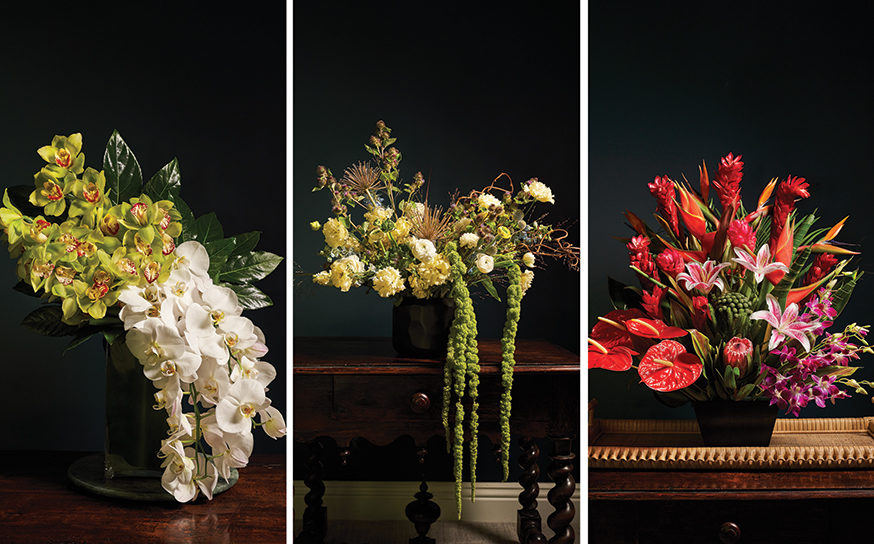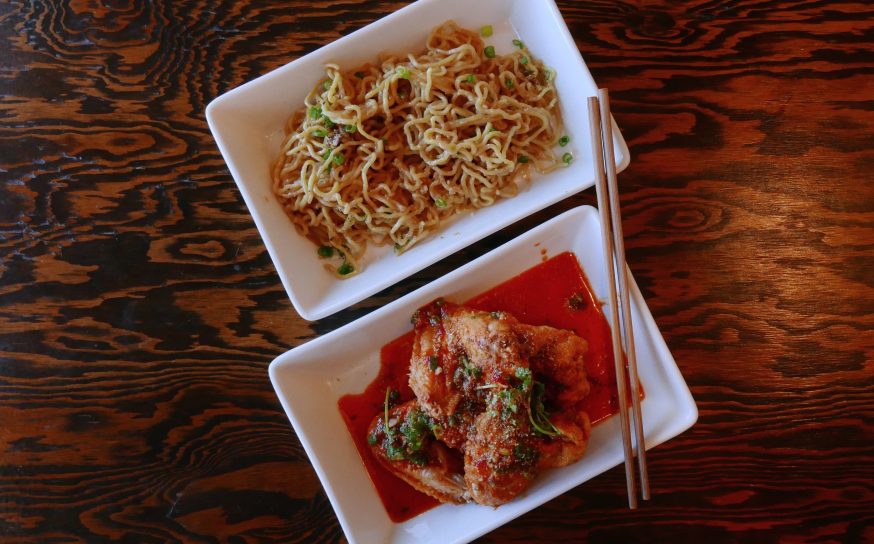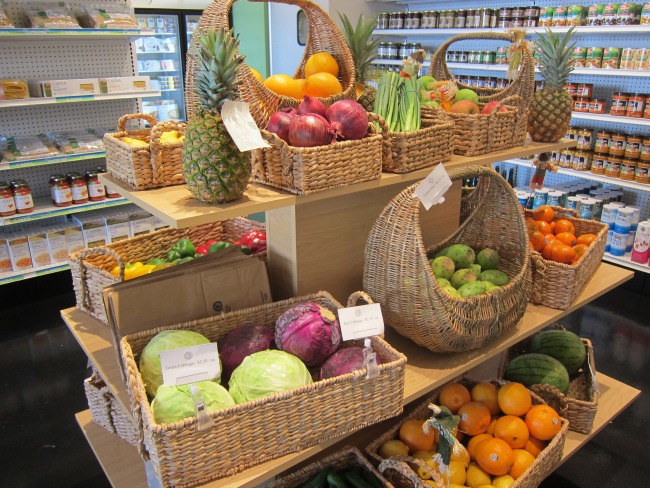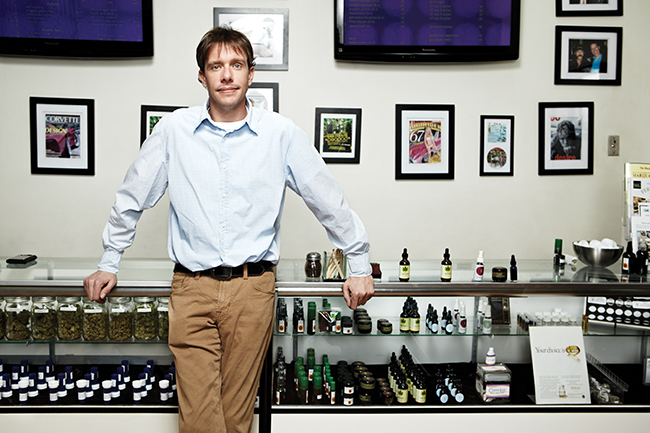
Green Rush
While some rejoice at the proliferation of pot shops in the Valley, others remain ardently opposed. But both sides agree: Marijuana—from walnut-sized buds to gourmet edibles—is a rapidly growing industry that’s here to stay.
-
CategoryUncategorized
-
Written byMike Szymanski
And over here, we’re going to have a juice bar,” Sam Humeid points, waving his arms toward the corner of his newly expanded Studio City medical marijuana dispensary.
A juice bar … in a pot shop? Yes. When Sam moves Perennial Holistic Wellness Center into its new digs in the new year, they’ll be serving a liquid cannabis confection mixed with carrots, celery and apples.
Perennial also sells other pot-laced gourmet or spa-esque products like olive oil and a balm to soothe joint pain. It is a well-crafted California marketing twist aimed at what is indisputably a booming market.
It’s the official December start day of LA’s new Prop D, which offers pot shop guidelines regulating everything from number of businesses to proximity to schools to the “no-no” of on-site use. Sam seems completely unruffled by the new law (he says he has always been an easy complier), and in fact on this day he is visibly excited. The 39-year-old is showing off the expansion of his medical marijuana shop in the mini-strip mall at Colfax Avenue and Ventura Boulevard, right next to the back entrance of CBS Studios.
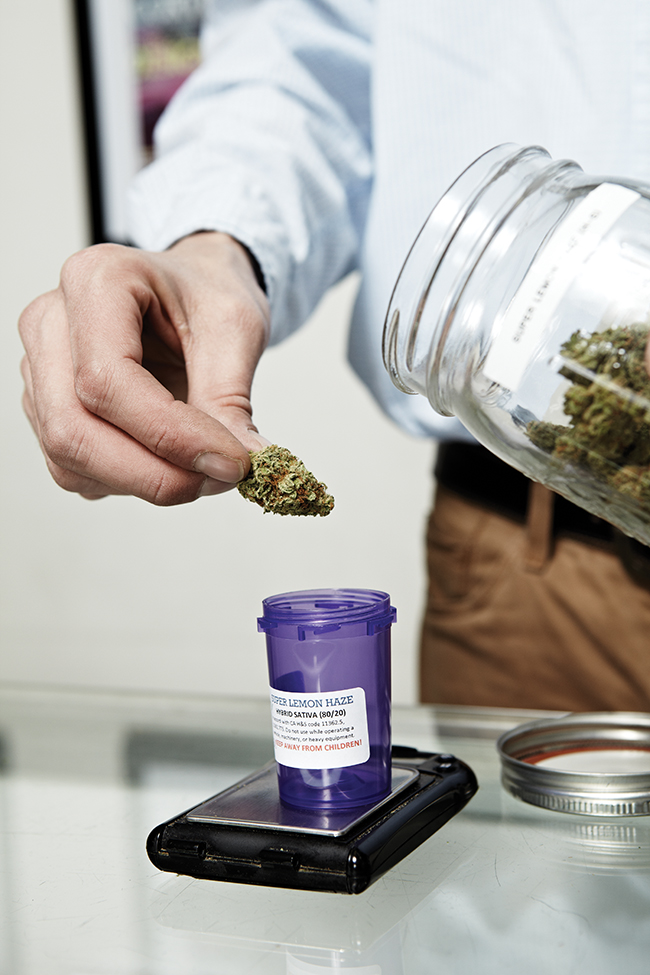 “It’s going to be very open, very light and airy,” says Sam, walking through his small space next door into the former adult video store. The expansion will add a total of 2,200 square feet to his existing space. “Nothing is going to be hidden. It will be all glass. We have nothing to hide.”
“It’s going to be very open, very light and airy,” says Sam, walking through his small space next door into the former adult video store. The expansion will add a total of 2,200 square feet to his existing space. “Nothing is going to be hidden. It will be all glass. We have nothing to hide.”
“How are you?” Sam greets a man delivering a plastic gallon-size bag of marijuana. “It’s called Phyllis Diller, and it is our #1 seller,” he quips. Gesturing to the grower as he exits, Sam adds, “His dad used to work on Laugh-In, so he knew the real Phyllis Diller.”
The most popular strains here are sativas. “They are cerebral—good for creative types who don’t want to fall asleep when they use it—they just want to keep doing what they do,” he explains.
Sam buys from a variety of California growers. “There’s an art and science of the different kinds of potencies and how people react to different strains.”
He has not only enjoyed pot since college but claims that it has positively impacted his life. “I passed all my exams on Blue Diamond,” the lanky entrepreneur states.
It is easy to explain how so many pot shops got here. Landlords have increased rents, forcing out many longtime small business owners. And who can afford these new rents?
Pot shops come in all shapes and sizes. Some are fashioned like health food stores. Others favor a ‘60s motif. All are riding the wave of what was estimated to be a $2 billion dollar nationwide market in 2012.
These are not dirtbag operations. In fact some, like Sam’s, are more akin to high-end Beverly Hills boutiques. Patrons are serviced by a valet and then greeted by an employee who checks IDs and medical marijuana licenses at the reception area.
In hushed tones, employees man the glass counters, listening to customer’s woes before discussing options. They pull out jars of chocolate-hued buds for patrons to sniff and examine for “crystals” (a sign of potency) under a microscope. The face of comedian John Belushi, who died of a drug overdose in 1982, hangs on a wall behind them.
Customers range the full gamut—from a rail-thin Tory-Burch-and-Burberry-attired counselor who uses pot to increase her appetite to a warehouse worker who wants to decrease chronic back pain. Card-carrying patient David Lizama suffers from a painful degenerative joint disease.
“I use this so I can face the darkness of my day,” he says. “It’s a necessity for me; it’s my only solution.”
Another user, Sara Diesel, admits some people might be surprised that she has a card. “I am not a 25-year-old male that you hear frequently telling these stories. I’m a 32-year-old female, and I am just like anyone else.”
She battles anxiety and depression and, she says, “I work four jobs. There’s a lot of stress.”
Other people we talked to confide with a “wink-wink” that they obtained licenses by visiting a doctor claiming various ailments—we’ve heard everything from work stress to a hangnail—but admitted they simply enjoyed getting high.
Like many of his customers, Sam Humeid also seems pretty mainstream. The LA native and CSUN graduate was a former financial planner. He has run for office on the Studio City Neighborhood Council and serves on several committees.
Perennial was the first marijuana business to register in all of District 2, represented by LA City Council member Paul Krekorian. And the councilmember made a personal visit to the store after it opened. Sam just signed a 10-year lease.
The issue isn’t eradicating marijuana distributors—it’s how many there should be and how they should be regulated. The concentration of medical marijuana businesses in upscale Studio City is the highest in all of Los Angeles—more than in the congested Hollywood area, more than in Echo Park near downtown, more than in Chatsworth, where the police closed down many shops in a sweep last year. At one point, there were 23 businesses listed along Ventura Boulevard from the Cahuenga Pass to Coldwater Canyon.
Nestled against the million-dollar hillside homes, posh boutiques and pricey sushi eateries, there are more marijuana distributors in Studio City than McDonalds, 7-Elevens and Starbucks combined. This disproportionate number clearly goes against the whole reason for the law. Prop D allows 134 pot shops to remain open in all of Los Angeles—they’re in the process of shutting down about 800 others.
But Studio City, has 11 active marijuana businesses with a population of 38,000. That is a ratio of 1:3,454. Compare that to the ratio of pot shops to people in all of Los Angeles, mandated by Prop D—1:28,358 (134 pot shops/3.8 million population).
Another way to assess it: Studio City is 1/100th of the population of LA. So if you allocate the 134 allowed pot shops under Prop D proportionally, Studio City should only have 1/100th of 134—or 1.34 pot shops, not 11.
Actor and activist Mike Farrell, who is on the Land Use Management Committee, lives around the corner from Perennial. “I’m not sure I understand why there are 11,” he wonders aloud. “Would the demand not be satisfied with two instead of 11?”
“It’s absurd and unnecessary to have so many businesses like that so close to a residential community,” insists Lisa Sarkin, outspoken vice president of the Studio City Neighborhood Council.
Lisa takes issue with her reputation as the pot prude of the Valley. She lives only a few hundred feet from Sam’s shop and claims she has occasionally caught a whiff of pot smoke.
“I know what pot smells like, but I’ve never tried the stuff,” says Lisa. “I’m allergic to the smoke. I know we have to live with it. I know the state voted for it. I know they pay their taxes. I know that Sam is one of three owners that have been involved in committees that have dealt with neighborhood concerns. That is good. But I still get phone calls and emails all the time from the community complaining about what goes on around those businesses.”
Lisa says she has visited some of the local shops and seen and smelled smoke inside and out, in violation of Prop D rules. She shares that one time she saw a religious leader come out of a shop, get into his car and drive erratically.
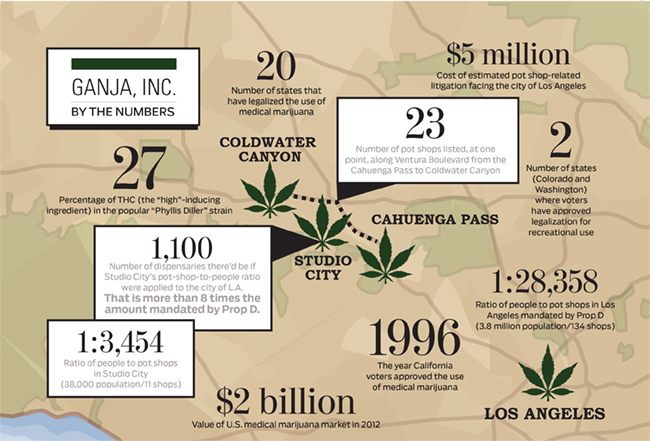
“He got into his car and cut off two cars on Colfax as he drove away. It’s so unsafe,” she recalls.
The Studio City Neighborhood Council, comprised of elected community members, makes recommendations to city officials. They recently formed a Medical Cannabis Collectives Advisory Committee led by local attorney Joann Deutch and including Sam Humeid.
Complaints have poured in. The owner for a popular vegan restaurant says the eatery is being inundated by smoke coming from next door.
Reps from the new CrossFit and Vendome have also cited problems. “When we were holding wine tasting events, we could smell the marijuana next door,” complains Vendome manager Patrick Crotty. “It’s hurting business.”
So the council came up with 18 recommended conditions for the collectives to operate, some of which are more stringent than Prop D. One, for example, forbids loitering. And some of the business owners have reported improvements.
Others are keeping a keen eye on Studio City. Sarah Armstrong, a legal liaison for the Greater Los Angeles Collective Alliance representing marijuana businesses, says, “This kind of communication is good. It’s a more sophisticated and knowledgeable approach to the issues, and this is a very forward-thinking community.”
Buds and Roses store owner Aaron Justis (who also serves on the Medical Cannabis Collectives Advisory Committee) enthuses, “This community could come up with something, and it will be good for the whole state, the whole country, to see what can happen at the local level.”
Neighborhood Council president John Walker says he is meeting with city attorney, Mike Feuer, who is considering implementing something similar for all of LA. “We are evolving, and when he is comfortable, something will come out,” John shares.
Meantime, the LA city attorney’s office is apparently sorting through dozens of lawsuits—business owners suing the city for what they claim is the detrimental effect pot shops have had on their businesses. It is estimated that litigation could cost the city at least $5 million.
Fortunately, there does not appear to be a correlation between pot shops and crime. The top cop who patrols
Studio City is senior lead officer Mike Lewis. He proudly touts that, other than car break-ins around Fryman Canyon and celebrity house swatter calls, he has one of the safest areas in LA. He says he has not seen an increase in crime around or near the local marijuana businesses.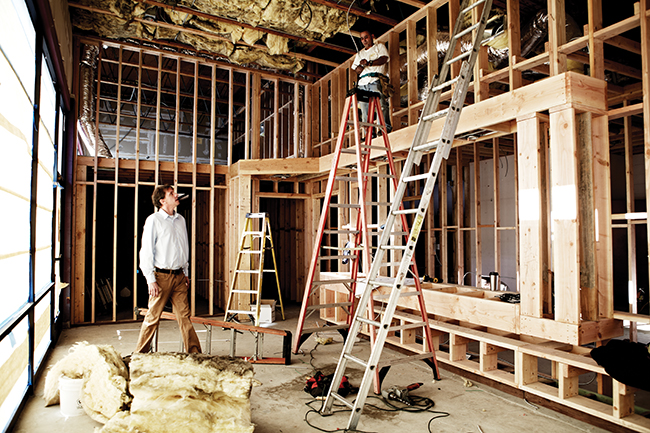
When his colleagues in the Chatsworth division carried out the sweep last year, Officer Lewis did not agree with the tactic. “We of course will follow any order that the city attorney’s office gives us, but frankly it hasn’t been a problem. And even if arrests are made, people don’t tend to stay in jail for very long anyway.”
Nationwide, 20 states have approved the use of medical marijuana, defying federal laws that say it is still an illegal drug. In Washington and Colorado, pot is now also legal for recreational use, and there are four propositions heading for the California ballot this year advocating that we follow suit.
“Why has California taken so long? Well, it really hasn’t, this has been something that has been decades in the making,” says Sam Humeid, seeming almost indignant about his home state, where he considers himself a groundbreaker. He recently traveled to Colorado to learn more about how they prepared for the all-out legalization.
“Frankly, they’re rather new at this, and their product isn’t as good. When it happens here, it’s going to be done right, and it’s going to fit right into the community, like it does here in Studio City.”
Some of the neighbors remain concerned. Denise Eliot has lived in Studio City for 13 years, bringing up three children. “I can’t help but wonder if my concerns against legalization aren’t similar to those who were in favor of prohibition, but my biggest concern is robbing young people of their motivation and potential,” worries Denise.
She continues, “I have kids who told me there are so many of their friends smoking pot in junior high. It’s out of control; it’s as bad as the ‘70s. While being illegal may make something more attractive for a few, making it legal will definitely make it more acceptable to many more students.”
Valley mom Lisa Thomas, with three young children, agrees. “Why do we need so many of these businesses all around us? That’s not the kind of area we moved to, and it’s not the kind of area I want them to grow up in,” she says.
As the debate continues, Sam says he’ll simply continue running his self-styled, evolving business—one he never could have imagined he’d own. “There’s no school to go to; it’s all anecdotal knowledge,” he says.
Sam says his new space will include a hydroponic facility that shows people how to grow their own plants. “I will probably triple in business and will hire more people,” he says, though he insists his profit margin isn’t high. “I get a salary, but I’m not a millionaire.”
After paying 15% in taxes, he claims “the other 50% of my revenue goes to pay for the cost of the marijuana. I’m left with 35% to pay rent and my employees. For customers, it’s a membership base, something like paying dues to a country club organization.”
Sam does not aspire to be a model marijuana business. He says he’s just trying to cater to community concerns and stay within the law as he prepares to open his new digs.
Will he have a grand opening? Like everyone else, he is in wait mode to see how it all shakes down. “We’ll wait and see about that,” he hesitates. “But there’s no question that I’m here to stay.”







